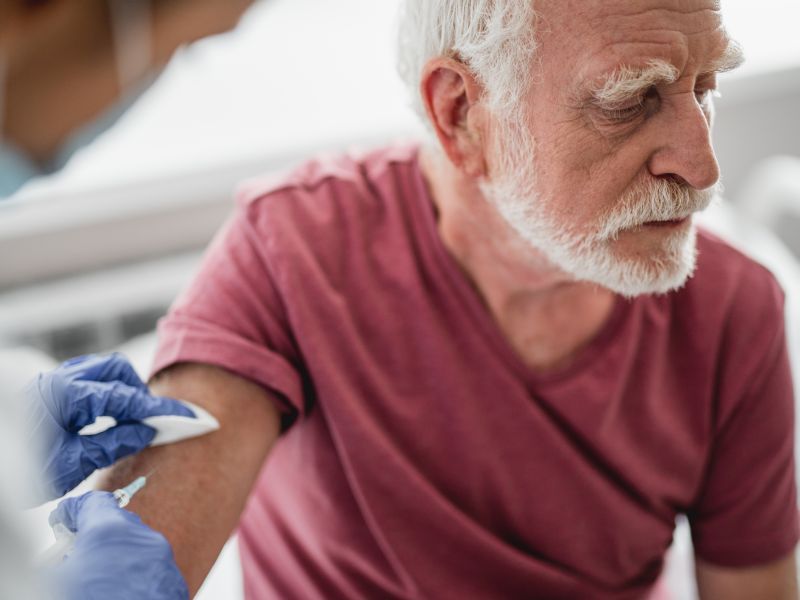MONDAY, Feb. 22, 2021 (HealthDay News) — Worried or wondering about COVID-19 vaccines?
Many Americans are, so experts at Penn State Health are offering some reassuring insight.
“People are approaching this vaccine with more hesitation because it was approved quickly, but that really just speaks to how far we have come in vaccinology,” said Dr. Mohammad Ali, an infectious disease physician at Penn State Health Holy Spirit Medical Center in Camp Hill, Penn.
“This vaccine went through all the same rigors and reviews by independent data and safety committees as any other vaccine. No corners were cut,” he said in a Penn State news release.
If you feel sick after getting the vaccine, it doesn’t mean that you have COVID-19.
According to Dr. Jillian Ventuzelo, a family physician at Penn State Health St. Joseph Medical Center in Reading, “Common symptoms such as headache, fatigue, body aches and fever are reactions we might expect to any vaccine. You’re making antibodies, and it’s actually a good sign that your immune system is doing what it’s supposed to do.”
Some people may have a stronger reaction to the second dose than to the first, and that’s normal, too.
“Your body made preliminary antibodies after the first dose, and they’re more robust as you are creating the memory immune cells to fight future exposure,” Ventuzelo explained.
She recalled that after her first dose, she had a sore arm. But after her second dose, she had chills, body aches and extreme fatigue that caused her to miss a day of work. Ventuzelo said she was better within 48 hours.
Any symptoms of severe allergic reaction (anaphylactic shock) after vaccination — such as low blood pressure, an elevated heart rate or trouble breathing — are rare and usually occur within 30 minutes. That’s why people are asked to sit and wait after getting the vaccine.
Any swelling, redness or warmth that occurs later at the injection site could signal an infection or developing hives, and you should call your doctor, Ventuzelo said.
But take heart: If you don’t have a reaction to the vaccine, it doesn’t mean that it’s not working.
Everyone’s immune system reacts differently and age can also play a role. People younger than 55 tend to have more severe symptoms because their immune systems have a stronger response to the vaccine.
And no matter how old you are, you still need to wear a mask and social distance after you’re vaccinated.
Ali explained that “the trials looked at the prevention of symptomatic disease, so we don’t know if the vaccine will stop asymptomatic spread. You could be a carrier with no symptoms and transmit the virus to a person who is not immune.”
That also means that even if you’ve been vaccinated, you still need to get tested for COVID-19 before you travel, the doctors said.
So why bother to get the vaccine if you still have to take precautions?
“We know the vaccine is stopping mild, moderate and severe symptoms and stopping hospitalizations,” Ventuzelo said. “By getting it, you’re saving yourself from complications and potential hospitalization.”
Plus, widespread vaccination will eventually stop community transmission and protect people who can’t get vaccinated due to medical reasons.
If you’ve had COVID-19 in the past 90 days, you could delay getting vaccinated because it’s unlikely you’ll get the virus again so soon. However, there’s no harm in getting vaccinated as long as you’re over the acute illness and isolation period, Ali said.
It’s still unclear how long the vaccines provide protection.
“Vaccine manufacturers will be evaluating when immunity wanes, so we will know more as time goes on,” Ali said.
Early research suggests that the vaccines protect against mutated versions of the SARS-CoV-2 virus, so that’s another reason to get your shots, Ali said.
“If you get the chance to get it, do it,” he said. “It’s the only way out of this at this point in time because it’s so rampant.”
More information
The U.S. Centers for Disease Control and Prevention has more on COVID-19 vaccines.
SOURCE: Penn State Health, news release, Feb. 17, 2021
Copyright © 2026 HealthDay. All rights reserved.

